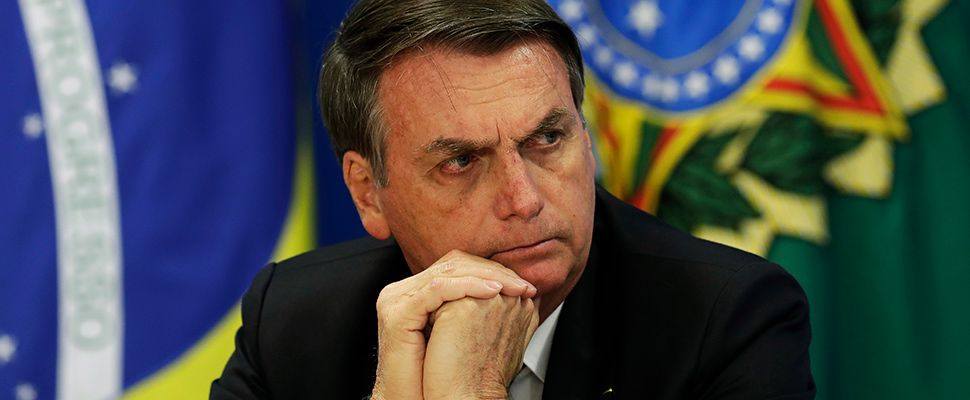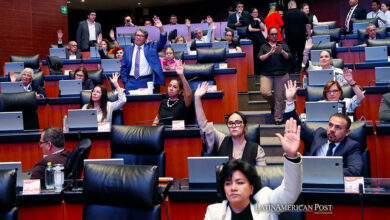After the first year in the presidency of Jair Bolsonaro in Brazil, the president is already looking towards the 2022 elections, where he hopes to be re-elected.

Jair Bolsonaro, president of Brazil. / Photo: AP
LatinAmerican Post | Juliana Suárez
Listen to this article
Leer en español: Jair Bolsonaro: un año de un gobierno nacionalista
This ex-military turned a year as president of the largest country in South America on January 1, and since before reaching the presidency he has stood out for his controversial phrases and way of thinking, as well as his intention to preserve the more traditional values of the family around the whole country.
Bolsonaro managed to win the presidency with an anti-corruption speech, because at the time of the elections, several ex-plaintiffs were dotted with corruption cases, which allowed him to win over a town tired of these scandals. With that message came a mandate also focused on traditional policies and a nationalist speech that he sought, similar to Trump's presidential campaign in 2016, to exalt the country.
Also, his first year has been marked by phrases that led him to be in the eye of the hurricane because he considered himself macho, xenophobic and homophobic. And like them, their policies also had some of this connotation.
Despite having disapproval of more than 40 percent of citizens, a number that doubled in the first months, President Bolsonaro described his first year in the presidency as 'victorious'. In a message on his Twitter account about the new year that starts with the anniversary of his mandate, he wished: “that Brazil continues to follow the path of prosperity and that this year is as victorious for the Brazilian people as 2019 was” .
In this new year of management that begins for the most ultra-right president of the region, he said he wants to continue building a country centered on the family and God in the middle of it. He also announced that he will seek the creation of his own political party that is “really conservative” and that serves as a springboard to be elected again in 2022. With the Alliance For Brazil party, Bolsonaro will continue to focus on strengthening the country's economy through of the nationalist and anti-globalization discourse that has also been permeated by the privatization of multiple Brazilian companies.
– Que o Brasil possa continuar seguindo o caminho da prosperidade e que este seja um ano tão vitorioso para o povo brasileiro quanto foi 2019. Estaremos, juntos, trabalhando noite e dia, para mudar o destino de nossa nação.
– A TODOS UM FELIZ E ABENÇOADO 2020!
— Jair M. Bolsonaro (@jairbolsonaro) January 1, 2020
These were two of his most controversial milestones during his first year in office and that put him at the center of international attention.
1. Venezuelans in Brazil
During 2019, Venezuela's immigration crisis increased, which led almost two million Venezuelans to leave their country in search of a new home. The most affected countries were the main borders of Venezuela: Colombia and Brazil. Each of the Latin American countries took different measures against these displacements and income of Venezuelans to their countries and Brazil, as might be expected, took one of the toughest measures against its neighboring country.
Also encouraged by the nationalist boom and, therefore, xenophobic and discriminatory, Brazilians did not receive Venezuelans in a good way. At the border, citizens took care that those fleeing from Venezuela did not feel welcome, with xenophobic harangues, singing the anthem of Brazil as a way to show sovereignty and greater grandeur in front of their neighbors and even in some parts they fired refuge shelters to the migrants.
Also read: 10 years and 10 facts in Latin America
These actions were endorsed by President Bolsonaro because his attitude showed no rejection of discriminatory acts. On the contrary, the president's reaction was arsonist by taking some military troops to the border and closing it to prevent the Venezuelan passage to his country.
2. Fires in the Amazon
The Amazon fires during 2019 grew in such a way that they reached their peak in August when the fire was impregnated in the rainforest, considered the lung of the world. Brazil was indicated as the main culprit of this, because not only most of these fires were in its territory, but Jair Bolsonaro had already shown his disinterest in preserving the environment and combating climate change.
The slow action of the Brazilian government was one of the main problems, where it was also compared with Bolivia which was the other country whose portion of the Amazon was also being affected, and which acted a little more effectively. In addition, in the midst of this climate crisis, several countries, including those of the G7, offered to help Brazil, which Bolsonaro denied in accusing these countries of wanting to affect Brazil's sovereignty.




